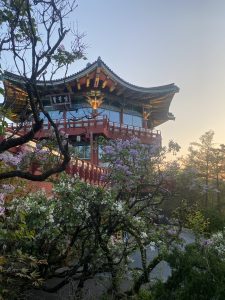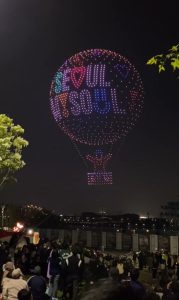Imagine studying in Seoul, South Korea – a city that never sleeps. Where you grab breakfast at a convenience store, attend a student band concert in the evening, and in between, create jewelry, prints, or knitwear in studios where students often stay overnight. Linda and Lucia decided to step out of their comfort zone and immerse themselves in a completely different world for a few months. In this interview, they share their impressions, joys, and culture shocks. You’ll learn what it’s like to study at Konkuk University, how they adapted to life without a kitchen, why onigiri with coffee became their go-to breakfast, and what this experience gave them for life and further studies.


Why did you choose South Korea and Konkuk University in particular?
Linda:
Honestly, South Korea wasn’t my first choice – it was the Philippines. But since the university rejected that proposal, I went for another Asian country, because I really wanted to go outside Europe. I chose South Korea, specifically Konkuk University, because our home university already had a contract with them, which made the process much easier.
Lucia:
Korea had been my dream destination for a long time. Konkuk also had excellent ratings and a wide selection of art-focused subjects, which was very appealing to me.
What was studying at a Korean university like?
Lucia:
Koreans take their studies very seriously – it’s difficult for them to get into quality universities, so they are fully dedicated. In the Art building, some students even stay overnight when they have a lot of work. The grading system is different – attendance, class participation, and semester-long projects are all taken into account, not just a final exam. There are various smaller assignments throughout the semester. Courses are registered on a “first come, first served” basis, and since we were on the plane to Korea during enrollment, it wasn’t easy. Despite the academic pressure, students have no problem going out and partying all night. The campus convenience store and cafés were the busiest after 1 a.m.
Linda:
At UTB, I study footwear design, and all my practical courses are focused on that field. In Korea, I studied a program called “Living Design,” and under that I had several design subjects, each focused on different areas – jewelry, home accessories, textile printing, knitwear, and more. At first glance, they might seem unrelated, but they actually connect beautifully once you learn how to work with them. For me, gaining such a broad scope in design fields was a huge plus and very enriching.
What was the accommodation like?
Lucia:
We lived in a shared dorm room for €350 per month. I definitely recommend it – everything related to the university was close by. The downside was that we had to get our own duvet and pillows, and there was no kitchen in the dorm, which was a big adjustment for us. However, the campus environment was very pleasant and romantic. There was a large lake in the middle of the campus, and various animals wandered around – geese, big birds, etc. Sometimes there were events during the day or the school band would perform.
Linda:
The living space was significantly smaller than what we’re normally used to, so we had to make do. But in terms of location, it was excellent. We were really close to school and had various shops just a few steps away.
How did you handle food?
Lucia:
For breakfast, I usually bought an onigiri and an Americano “to go.” For lunch, we went to the university cafeteria where a meal with soup cost around €3–4. We tried street food, traditional Korean dishes, and Korean BBQ. In the dorm, I made instant noodles, pho, spaghetti or rice, which we bought in nearby 24/7 stores. I really miss Korean fried rice, bibimbap, and tanghulu. One of my favorite meals in Korea, though, was mashed potatoes and schnitzel from Korean KFC – it reminded me of home.
Linda:
Since we didn’t have a kitchen, we couldn’t cook. Thankfully, Korea has the advantage that eating out really isn’t expensive. In fact, sometimes it’s cheaper than cooking for yourself. That was one of the surprising things for us.
What surprised you most about Korea?
Lucia:
What surprised me the most was how safe I felt in such a big city. I could easily leave my suitcase with my phone and wallet in front of a shop for half an hour and no one would steal it. We were just a bit more cautious during the protests. It was also surprising that things which are cheap here are expensive there – and vice versa. In Korea, there were always lots of events, pop-up shops and fun activities – for example, the Lantern Festival with allegorical floats celebrating Buddha’s birthday, or weekend drone shows. There was always something to do. But I was also surprised by how excessively sweet their cuisine is. For example – their favorite dark beer, Kozel, is served with whipped cream and cinnamon on top.
Linda:
I was also pleasantly surprised that many services operate non-stop, so even if we worked on school projects late into the night, we could still go out to eat afterwards. It was definitely surprising that the majority of clothing stores sell only one size, and if a woman has a shoe size larger than 39, she won’t find shoes there.
What surprised me negatively was the lack of deeper contact with the local people. They are quite focused on themselves and their work. They’re not the kind who would approach you on their own. They are quite shy. And also, whatever you want to arrange there, it goes through a very complicated verification process, it’s handled in detail, and it’s time-consuming. Even if you want to order something small from the internet, you need to have a bunch of official things set up beforehand, just to be able to do something that simple. So in that sense, it’s very complicated until you manage to set up your life in a way that allows you to fully function in Korea.
Did you experience any culture shock?
Lucia:
The biggest culture shock for me was that in Korea, blowing your nose in public is considered impolite. But at the same time, people go to school in pajamas and to the store in headbands and slippers. They also have great lifehacks – for example, they turn their backpacks into lap desks.
Linda:
I can say that I was surprised by how few tourists there are in the country, and many times we found ourselves being the only white girls around for quite a distance, and we could really feel how everyone was looking at us.
And maybe I’ll mention something personal that I see very differently and didn’t expect to be part of my culture shock – the men there are not gentlemen toward women at all. Well, they are – but only if you are their girlfriend. Otherwise, I think we have much more polite and respectful men toward women than they do. They’ll wait for you to open the door for them.
Was Korean necessary, or was English enough? How did you handle the language barrier?
Lucia:
We had Korean language classes, and I tried to at least say hello and thank you in shops. Otherwise, I used Google Translate or ChatGPT. Some older people weren’t happy that we didn’t understand them, but they often wanted to take pictures with us. We also had one professor who didn’t speak a single word of English, but we managed thanks to the translator.
Linda:
Most people were at least willing to communicate through a translator if they didn’t understand English. Although there was one case, when we were trying to get materials for school, where they weren’t willing to communicate at all – not even through the translator – they didn’t want to read what we showed them and just sent us away. But that was one of the few exceptions. Otherwise, people were generally willing and we always managed somehow. But as for having a fluent conversation or maybe forming deeper friendships – that wasn’t really possible.
What did you take away from the stay – personally and professionally? Did this stay change you in any way?
Lucia:
I improved my English and learned a lot in our subjects – how to work with new materials, but also that the final result isn’t everything. The idea, the concept, and the whole process are just as important. It gave me more confidence and perspective. I learned to broaden my horizons and became more open to traveling the world. I won’t be so afraid to travel anymore, and I know that even a student from a small town can quickly adapt to life in Seoul. And even though we were in a country where few people speak English and all the signs are in Korean, with effort, a smile, and a translator, you can communicate anywhere.
Linda:
Personally, I’m taking away many experiences from this stay – cultural enrichment, new flavors, and new things that I never thought would interest me, but they did, and I grew to enjoy them. I changed my perspective on many things, and I definitely matured in some way, learned to navigate the big world. And I think it definitely boosted my confidence, my ambitions, and in a way also my standards. On the other hand, I learned to appreciate things that I may have previously taken for granted.
What three things would you recommend to anyone preparing to study in Korea?
Linda:
To anyone heading to Korea, I would first of all recommend leaving enough time to take care of all the administrative tasks before departure, because it was really time-consuming and demanding. It’s really important not to underestimate this, and even after arriving in Korea, there are many things to arrange – at the offices, the bank, immigration, getting a phone number connected…
Secondly, I’d definitely recommend downloading a translator app with Korean language offline support. It’s crucial to have it on your phone, because if you don’t speak Korean, you’ll often find that in shops and restaurants, the menus and product descriptions are written only in Korean.
And third – check carefully when exactly you’re planning to go. If someone wants to visit just for a holiday, I definitely don’t recommend going in July, as that’s the rainy season in Korea.
Lucia:
I recommend that everyone starts out with a lot of patience and energy, because it takes time to get everything sorted. It’s definitely important to download Korean apps in advance, because things like Google Maps don’t work there. Without them, it’s easy to get lost.
Be sure to do your research ahead of time – how public transport cards work (they can be bought in every convenience store and topped up with cash only), and know that Revolut works well for payments.
Find out when the subway stops running, get a good SIM card (I recommend Chingu Mobile), and have a clear plan for how to get from the airport. That way you won’t be confused upon arrival.
And most importantly – don’t be afraid. Everyone is very helpful and willing to assist – it’s really not as difficult as it might seem at first glance.

